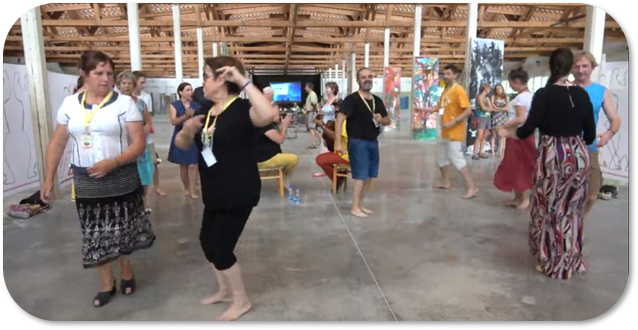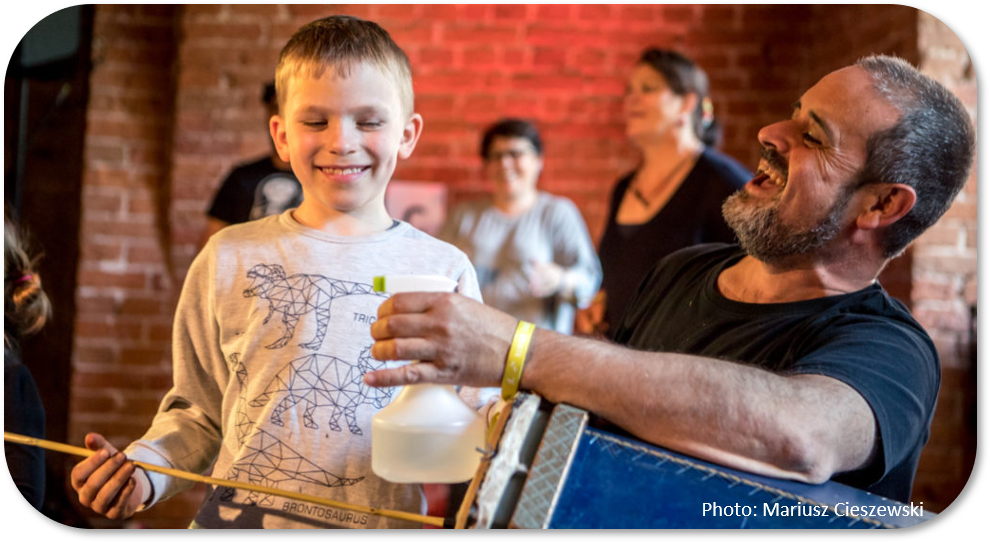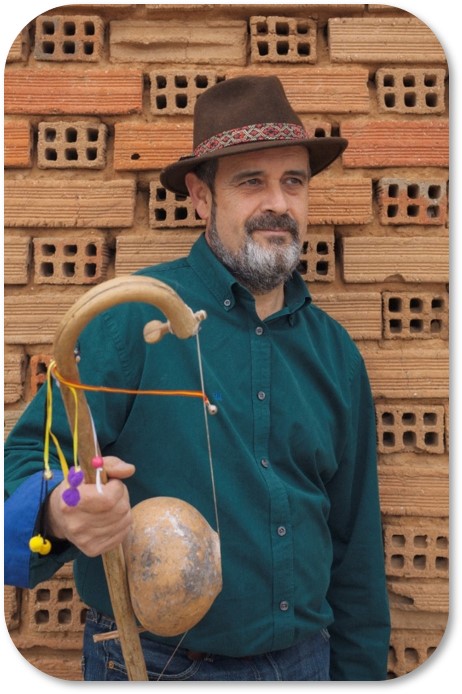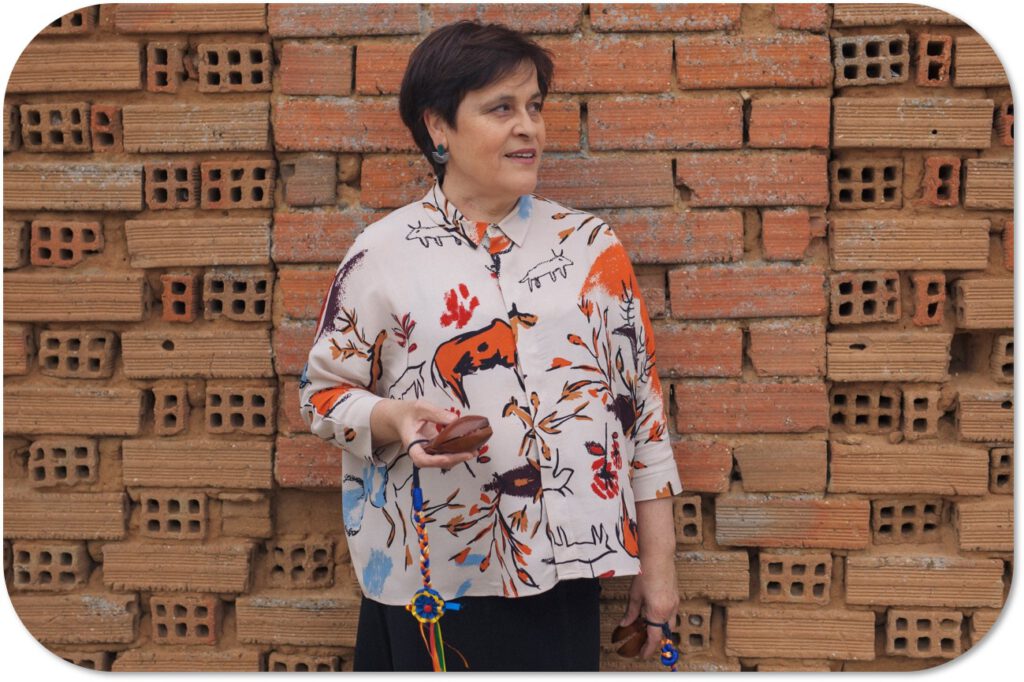In few words
Vigüela take their tradition with accuracy and show it is a living music, full of joy, and showing it doesn´t need to be denatured to divulge it. They have been working for 30 years to keep alive this style from their land, Castilla-La Mancha, the South part of the Iberian plateau, at the heart of Spain, main landscape for the iconic Don Quixote de La Mancha, the novel by Miguel de Cervantes.
In April 2016 their album Temperamento was released by the British label ARC Music. This year they are having a tight calendar, with concerts in Spain, Norway, Hungary, Sweden and Germany (tour with 12 concerts and 4 workshops).
“We work with old songs that have been part of our days, our duties, our life. They talk about what we are, because we are inside them and everything around us. We perform them in our style, our way that we have inherited for been from our village, El Carpio de Tajo, where people sings very gracefully”.
Nevertheless, in 2014 Vigüela start a work of rigorous review of their own approach to the performance of traditional music, taking a further step on the recovery of an archaic musical language, that has been kept alive right up to present days, usually in contexts alien to the circuit of professional music and that, most of the time, has been scorned and undervalued, in opposition to seemingly more modern proposals, that frequently simplify, diminish and standardize the musical expression of the people, silencing the characteristics that make it truly special and enriches it.
Bio
Vigüela take their tradition with accuracy and show it is a living music, full of joy, and showing it doesn´t need to be denatured to divulge it. They have been working for 30 years to keep alive this repertoire and style from their land, Castilla La Mancha. They have played all over Spain and also in Great Britain, invited by the BBC, and in Portugal, representing Spain at the Festival Bons Sons 2012, as well as in world music stages in Europe, like Førdefestivalen (Norway), Urkult Festival (Sweden), Fonó and Babel Sound Music Meeting (Hungary), the tour Klangkosmos (12 concerts in Germany) and for 2017 they have already confirmed gigs in Germany and Switzerland.
Juan Antonio Torres and his sister Carmen are involved in music since they were born under the wing of a family of musicians. Their father was professional drummer and Juan Antonio continued this legacy. He started as a drummer, performing with orchestras in the popular festivities. He learnt to play guitar and traditional instruments by himself, after falling in love with traditional music through the influence of their two grandmothers, that sang very well, even when they didn´t make it as their profession. Because of this love, when he was 20 years old, in 1986 Juan Antonio founds Vigüela with his sister Carmen, who was 23 and who is still part of the group, and some other young people from their village, El Carpio de Tajo.
Mari Nieto, one of the biggest singers in their region, joins them some years ago, after long years of activity in music, surrounded by old people, from who she learnt as in oral tradition. In suitable stages Araceli Tzigane joins the band for dancing and presenting (in English). Luis García Valera, active teacher and musician, director of the itinerary school of traditional music Entresierras, is the last signing.
Juan Antonio has worked also as artistic director with women choirs and children choirs, always focused on traditional repertoire, traditional styles, romancero (collections of narrative songs) and sacred music. Nowadays he teaches traditional styles (jota, fandango, seguidilla, son…) in his native village, and has extensively made field work, in example in the project of recreation of the historic trip that Alan Lomax made in the region of Castilla-La Mancha in 1952, searching for the still alive performers that were recorded by the American ethnomusicologist.
Therefore, Vigüela’s work is essential for the traditional music from their land. They are also very good performers that sing exquisitely the very melismatic repertoire, fruit of the melting pot that have been the Iberian peninsule.
Workshops available
Vigüela offers also a workshop of dance on traditional styles and/or of creation of lyrics on the usual meter of traditional styles.
Loose dance (without touching the other)
The jota, the seguidilla and the fandango are three of the main musical styles with associated dance from the center of Iberian Peninsula that have extended practically throughout all of it and also overseas, to the old Spanish colonies. The dance of these three styles is thrilling, communicative and aesthetically delightful. The loose dance, where you don´t touch your partner, is made in pairs (man-woman, woman-woman), and the dancers communicate with their bodies the emphasis and the emotion that the musicians and singers convey. They don´t touch each other but there they exists invisible ties for connection and communication, to say each other beautiful things with the gestures and movements of their bodies. The basics are quite easy and it can become more challenging and sophisticated according to the experience and skills of the dancers. To learn the basics of these dances means to practice the listening and the interpersonal communication, key aspects of an art form that reveals the nuances and the unpredictability of human emotions.
Creation of lyrics (Spanish language)
Addressed to Spanish speaking participants and/or students of Spanish language.
In this traditional music, the aforementioned styles of jota, seguidilla and fandango, as well as son (a not danced style), are performed on a succession of stanzas, recalled, adapted or even improvised by the artists, on a given meter and on an unpredictable sequence. This way, the lyrics can be made in the moment and used to communicate current events, to send poetic messages to specific participant/s, to launch defiances…
In this workshop, in two groups, each of them with members of Vigüela to support them, create some stanzas on the given meter for been sang. The main topic will be a defiance against the other group, always on funny mood. After that, the band will play and teach an easy melody, and the participants will distribute the stanzas they’ve created and they will sing them to the other group.
Combined workshops, with a part of creation of lyrics and a part of dance can also be provided.

 “德高望重的一群西班牙人民。”“快板、勺子、厨房器皿、铃铛等等,在维古拉的手中摇身变成美妙的乐曲。”“精美绝伦。”“一种乡村的、浓重的与美妙的声音。”以上是(Charlie Gillet)在BBC-广播3频道,对世界音乐、艺术与舞蹈音乐节(World Of Music, Art& Dance, 简称WOMAD)英国站,关于维古拉乐队表演的评论。
“德高望重的一群西班牙人民。”“快板、勺子、厨房器皿、铃铛等等,在维古拉的手中摇身变成美妙的乐曲。”“精美绝伦。”“一种乡村的、浓重的与美妙的声音。”以上是(Charlie Gillet)在BBC-广播3频道,对世界音乐、艺术与舞蹈音乐节(World Of Music, Art& Dance, 简称WOMAD)英国站,关于维古拉乐队表演的评论。



